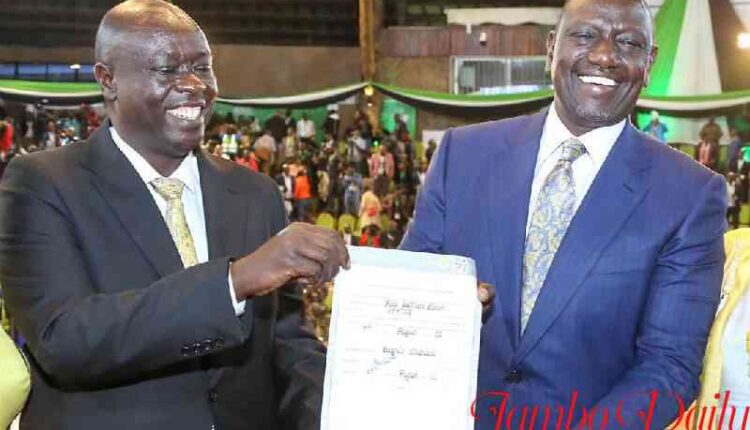
What Next After Ruto Declared President- Elect?
Following the election of William Ruto as Kenya’s president, legal battles and political intrigues are expected in the coming days.
William Samoei Arap Ruto, Kenya’s deputy president since 2013, has been declared the winner of a hotly contested election in the East African powerhouse.
Ruto won the election by a narrow margin, receiving 50.49 percent of the vote to Raila Odinga’s 48.85 percent.
“I swore to defend the constitution, I stand before you today despite harassment and intimidation. I did my duty in accordance with the laws of the land.” Wafula Chebukati, chairman of the IEBC Kenya, said on Monday evening.
“I… hereby declare that Ruto William Samoei has been duly elected as president in accordance with the law.”
What have the official reactions been?
“I will lead a transparent, open, and democratic government, and I will collaborate with the opposition to the extent that they provide oversight over my administration,” Ruto said in his victory speech.
Raila Odinga, who was William Ruto’s main competitor in the race has rejected the results, saying they are “null and void”. He has since declared that his team will be moving to court to challenge the results.
Emmerson Mnangagwa of Zimbabwe, Muhammadu Buhari of Nigeria, and Cyril Ramaphosa of South Africa have all tweeted their congratulations to the president-elect.
On Monday evening, Najib Balala, a member of Kenya’s ruling party and the country’s cabinet secretary for Tourism and Wildlife, also tweeted his congratulations. “You were elected President by God’s grace and the true will of the people.” “You have the power to change this country for the better,” he said.
Kenyans Reactions
Business and governance slowed in the days leading up to and following the election, as the country experienced an uneasy calm.
Protests erupted in parts of Nairobi and Odinga’s hometown of Kisumu, 350 kilometers (217 miles) northwest of the capital after the announcement of the results. In contrast, there was joy among Ruto’s relatives in Eldoret, Rift Valley, and Kapsabet, North Rift, where he attended high school.
Legal Steps
- According to the constitution, The president-elect should take an oath of allegiance to the constitution administered by Kenya’s chief justice within 14 days of the announcement of the results.
- However, this will be delayed as Odinga’s camp has already vowed to contest the results at the Supreme Court.
- According to the constitution, a petition to the Supreme Court – which could be filed by proxies or any other aggrieved parties, rather than just Odinga’s team – can be filed within seven days of the results being declared.
- The Supreme Court is required to hear and rule on any petitions filed within 14 days of the filing. The decision is final and conclusive.
- If the Supreme Court rules that the results are invalid, a new election will be held within 60 days of the decision.
- If the petitions are denied, the swearing-in will take place on the first Tuesday, 14 days after the announcement of the results.
- The oath-taking and swearing-in will take place seven days after the court issues a decision declaring the election valid if a petition is filed.
- Only three IEBC commissioners, including Chebukati, were present at the tallying center at the time of the announcement. The other four had left to disavow the results at a separate press conference. According to Odinga spokesman Makau Mutua, the chairperson’s announcement was “invalid because he did not have a quorum of commissioners to hold a plenary and make such a weighty decision.”
- Steve Ogolla, the managing partner of Nairobi-based law firm Saroni & Stevens Advocates, is of the opposite mind. “The chairperson of the IEBC shall declare the results of the presidential election,” he said, citing Article 138(10) of the Constitution. “The law does not require a quorum.” To put it another way, “the walkout of four commissioners taints but does not invalidate the results.”
2017 rerun election
The Supreme Court declared the presidential election invalid in 2017, citing irregularities. Odinga claimed that the results were tampered with, and the court acted when the IEBC refused to provide its computer servers for inspection.
Odinga boycotted the rerun in October of that year. Current President Uhuru Kenyatta was sworn in for a second term after receiving more than 98 percent of the vote.
Because of that nullification, the IEBC began uploading result forms from polling units to a public portal immediately after the election in 2022.
Analysts say that aggrieved parties hoping for a similar cancellation will have to go the extra mile. “Anyone going to the Supreme Court [in 2022] will be doing math,” Nairobi-based political analyst Dismas Mokua told Al Jazeera. “Because the probability of rigging is zero unless there is a magician somewhere who has the ability to hack the IEBC infrastructure, download and upload new things.”
Power Transition
The committee in charge of ensuring a smooth power transition met for the first time last Friday. It is chaired by Joseph Kinyua, the head of the country’s public service, and includes National Intelligence Service (NIS) Director Philip Kameru and several other high-ranking public servants.
The transition committee has stated that it is prepared to hand over power to the new president-elect, but disagreements cannot be ruled out now that Ruto has been elected. Analysts believe this is due to President Kenyatta’s support for Odinga through state machinery and top government officials.
“The committee’s key members have all shown a bias towards one candidate, Odinga, for whom they drummed support and attended some of his political campaign rallies”
“With such tremendous power at their disposal, they must openly set aside their differences and carry out their responsibilities.” political analyst Nicholas Ouma told Al Jazeera.
SOURCE: Kenya Constitution, KLRC, Al-Jazeera
